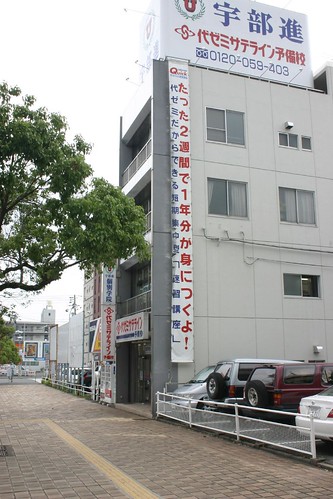Wednesday, August 17, 2005
Cram School or Juku
This is the "Ube Shin" Juku in front of Shin Yamaguchi Station.
Such is the competition to get into schools and universities that many teenagers attend a juku or cram school after the end of regular school. There are a lot of reasons for this.
1) The university that one attends largely determines the level of company that one will join and salary that one will receive when one graduates. Companies place great emphasis on obtaining graduates from the best universities.
2) The study that one carries out while at university often makes little difference - neither grade point average nor the level of degree make much difference to companies. The last time that academic achievement matters is at high school level, which fuels the market for cram schools.
3) Japanese schools may fulfil more of a socialising function than those in the UK. Schools, rather than the family, teach young people how to behave in groups. Due to importance of group formation at school, the teaching approximates to the "comprehensive" system in the UK, where better pupils can be held back by their peers. The teacher will be unlikely to move on to the next level. There is rarely streaming by class with rather classes forming close-knit groups.
4) The examinations used by universities are tractable to cramming, often placing an emphasis upon those things that can be learnt by attending a cram school. English exams for instance have traditionally placed an emphasis upon learning grammar structures that are complex even to native speakers rather than upon communicative competence. This is one of the reasons why most Japanese find it very difficult to speak English.
5) The system of fact based exams and cramming is also quite levelling in that the ability to communicate such as by writing essays is one which is predicated more on coming from a household where a lot of communication goes on, often in the more educated, and wealth homes or upon talent. Cramming is something that even the less talented teenager can do if he has the spirit and encouragement to do so. Even if ones father is a taciturn farmer or production worker then one can cram ones way into Tokyo University and the top of Japanese society.
5) Japanese cram schools are very good and very mercenary. A lot of work goes into analysing the entrance exams of the better schools and colleges. A state run school then more attention will be paid to covering the syllabus. The cram schools will concentrate on the content of the exam and the knowledge, tactics and tricks that one needs to pass it.
Such is the competition to get into schools and universities that many teenagers attend a juku or cram school after the end of regular school. There are a lot of reasons for this.
1) The university that one attends largely determines the level of company that one will join and salary that one will receive when one graduates. Companies place great emphasis on obtaining graduates from the best universities.
2) The study that one carries out while at university often makes little difference - neither grade point average nor the level of degree make much difference to companies. The last time that academic achievement matters is at high school level, which fuels the market for cram schools.
3) Japanese schools may fulfil more of a socialising function than those in the UK. Schools, rather than the family, teach young people how to behave in groups. Due to importance of group formation at school, the teaching approximates to the "comprehensive" system in the UK, where better pupils can be held back by their peers. The teacher will be unlikely to move on to the next level. There is rarely streaming by class with rather classes forming close-knit groups.
4) The examinations used by universities are tractable to cramming, often placing an emphasis upon those things that can be learnt by attending a cram school. English exams for instance have traditionally placed an emphasis upon learning grammar structures that are complex even to native speakers rather than upon communicative competence. This is one of the reasons why most Japanese find it very difficult to speak English.
5) The system of fact based exams and cramming is also quite levelling in that the ability to communicate such as by writing essays is one which is predicated more on coming from a household where a lot of communication goes on, often in the more educated, and wealth homes or upon talent. Cramming is something that even the less talented teenager can do if he has the spirit and encouragement to do so. Even if ones father is a taciturn farmer or production worker then one can cram ones way into Tokyo University and the top of Japanese society.
5) Japanese cram schools are very good and very mercenary. A lot of work goes into analysing the entrance exams of the better schools and colleges. A state run school then more attention will be paid to covering the syllabus. The cram schools will concentrate on the content of the exam and the knowledge, tactics and tricks that one needs to pass it.
Labels: japan, japanese culture, nihonbunka, 日本文化
This blog represents the opinions of the author, Timothy Takemoto, and not the opinions of his employer.

